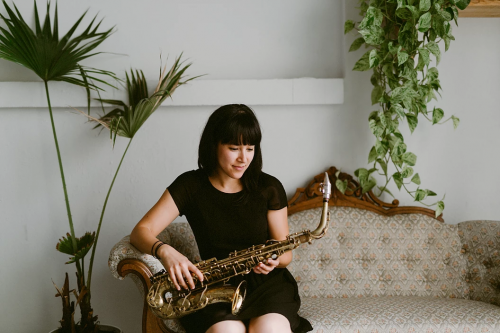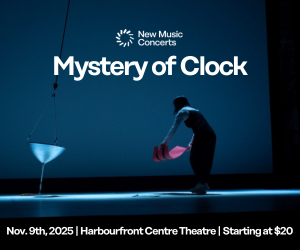![]()
 Allison Au – saxophonist, composer and bandleader – has been consistently busy since she graduated from Humber College in 2008. Her debut album, The Sky Was Pale Blue, Then Grey, was nominated for a JUNO in 2013; her second album, Forest Grove, won the JUNO in the Jazz Album of The Year: Group category in 2016.
Allison Au – saxophonist, composer and bandleader – has been consistently busy since she graduated from Humber College in 2008. Her debut album, The Sky Was Pale Blue, Then Grey, was nominated for a JUNO in 2013; her second album, Forest Grove, won the JUNO in the Jazz Album of The Year: Group category in 2016.
Au is preparing both to go on a cross-Canada tour (starting in Calgary on June 14 and ending in Montreal on July 5) and to record a new album of original music. I had the opportunity to sit down and speak to her recently about the new tour and the new album, as well as her compositional process, the history of her relationship to the saxophone, and a growing conversation about gender and privilege in the local jazz community.
The WholeNote: So tell me more about the music you’re writing for this new album.
Allison Au: It’s in the same vein as what we’ve done before, but I’m always trying to experiment more with keyboards. I kind of leave that up to Todd [Pentney, the pianist in Allison’s quartet], but I’ve been talking to him as I’m writing some new stuff, saying “this is the vibe, I’m going for this, here are some of the sounds you could work with.”
Maybe the bigger change is that I’ve started studying piano with Frank Falco. He’s kind of the shit. I have limited piano skills… and he’s great, because he really treats you just like a beginner, acknowledging that you have a musical background, of course: I understand the harmony and the theory, but technically I’m very slow to execute. So it’s really opened up my perspective. I was feeling, for a little bit last year, that I’d hit a wall with my writing. And because I use the piano so much for writing, I just don’t have the technique to figure out certain things.
WN: So what has that allowed you to do that you wouldn’t have been able to do before, in terms of writing and composing?
AA: From a technical perspective, [Falco] has literally given me some technique stuff to check out, so I feel [that I have] more command over the instrument. But I think, more importantly, every lesson has been an incredible theory lesson. He’s talked about the sounds of different chords, and ways to voice them that I never would have thought of. He’s a very open guy, and he talks in really simple terms, without being condescending.
He’s assuming that you don’t know, at the beginning of the lesson, where it’s going… and he takes you on a little journey. It’s really fun, and it’s awakened a sense of childlike exploration, which on a new instrument is awesome. Having played my instrument [the saxophone] there’s all of this stuff – this intellectual and psychological process happening in your brain – but with an instrument that’s relatively new to you, you feel as though you can get in touch with [a different] side of things, and things click in a different way.
WN: Has anything changed – or not – in your experience being a bandleader, being a woman, being a person of colour? People seem to be talking about this more openly now, in a way that they haven’t really before. I know that there’s been a conversation that’s been happening in the jazz community in Toronto.
AA: Well, you mentioned the New York Times article, which I read when it came out a few weeks ago. I am, of course, totally supportive of everything that’s happening, and I think that there are a lot of conversations that are overdue, but to speak to my own experience, I’ve been really lucky in my working environment and my school experience, in that I feel that I didn’t really experience anything really negative in that way. But I think that any woman in any situation does have to behave differently than men do; you can’t be too chummy with your male teachers, and there’s a lot of unspoken etiquette. And I did kind of lament that some of the male students could establish a friendly rapport with the male teachers, whereas with a lot of the women, [that close mentor/student dynamic] just wasn’t an option. That said, I absolutely support everything that’s been happening: certain things have now come to the spotlight and all of these voices are being heard, because people feel more comfortable with sharing.
WN: It’s interesting, because I think that some high school and post-secondary music institutions – from festivals such as MusicFest to undergraduate jazz programs – can enable women, and certain people of colour, to have access to a kind of training that they may not have had 50 years ago, when [jazz] was less institutionalized and more of an on-the-road/club culture. On the one hand, it opens it up to a lot of people – but at the same time, the very nature of institutional hierarchy means that there are mostly men who are represented in positions of power.
AA: Totally – and that representation matters. I know that for me, one of the big reasons I was initially attracted to playing the saxophone is because I saw a woman playing one.
WN: Who was it?
AA: Well, I went to an arts school from grades four to eight, and my band teacher was a woman who played the saxophone, and it was the biggest thing for me at the time. And, of course, Lisa Simpson [laughs]. Maybe even subliminally, that was a cool thing for me. I think at that age, you just see things and don’t even know why you like it, but you just think it’s cool. It’s as simple as that.
And the longer I do this, the nicer it is to see more and more women – who are both younger than me, and also older, who are inspirations to me – doing this.
It was really nice to read that Times article, because I agree with and support everything they’re saying, and I think it’s great that we’re having this conversation now. I know that there’s still a lot of work to be done, and there are conversations happening in every workplace, and it’s really important that we have it in music too, regardless of genre. In jazz there are still so few women, but more are coming every year – which is great.
Allison Au’s upcoming tour of Canadian jazz festivals runs until July 5, and includes stops in Calgary, Lethbridge, Medicine Hat, Winnipeg, Victoria, Vancouver, Edmonton, Toronto and Montreal. For details, visit www.allisonau.com.
Colin Story is a jazz guitarist, writer, and teacher based in Toronto. He can be reached through his website, on Instagram and on Twitter.



